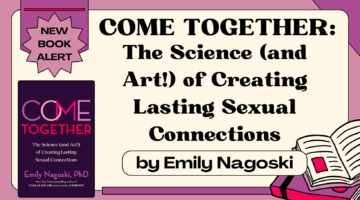Featured Book Series: Galileo’s Middle Finger
July 20, 2016 by Justin Lehmiller
I recently had the pleasure of reading Dr. Alice Dreger’s latest book, Galileo’s Middle Finger. This book had actually been on my reading list for over a year, but it took me a while to get around to it because I essentially work two full-time jobs between my academic position and all of the blogging/writing I do.
Oh, and I try to have a personal life on top of that—try being the operative word there.
Given that I have precious little time for pleasure reading these days, I select the books I want to read very carefully. Dreger’s book was a natural choice for me, though, because it had come highly recommended from several colleagues and also because I developed a bit of a Twitter crush on her after she live-tweeted her high school son’s sex education class last year.
I wish more parents did things like that. Maybe then we’d be able to hold schools and teachers to higher sex ed quality standards. Perhaps parents would have a better idea of exactly what their kids are—and aren’t—learning in these classes, too. But I digress.
So what exactly is Galileo’s Middle Finger all about? In a nutshell, it explores the tension that exists when the conclusions of scientific research conflict with people’s personal identities and politics. As you probably well know, this tension often arises when scientists study things like sex and gender—the results of such research don’t always confirm people’s preexisting beliefs about the world or tell them exactly what they want to hear.
The results of scientific research can be, well, downright uncomfortable.
And that’s where trouble often begins.
Dreger chronicles several instances in which research—primarily research on sexuality and gender—has collided with personal identity politics to produce disastrous consequences.
Researchers were attacked, lies were spread, and the truth distorted or suppressed.
For instance, Dreger explores the controversy the engulfed psychologist J. Michael Bailey upon the 2003 release of his book, The Man Who Would be Queen. Bailey’s work, based on a theory originally proposed by Dr. Ray Blanchard, challenged the conventional wisdom that transsexualism is only about people being trapped in the body of the “wrong” sex.
I’m simplifying a bit here for the sake of keeping this review relatively brief, but Bailey and Blanchard basically argue that, for some male-to-female transsexuals, there’s a sexual component to their desired transition. Specifically, some men find the prospect of becoming a woman to be sexually exciting—a phenomenon dubbed autogynephilia, a term that literally means “love of oneself as a woman.”
To many trans persons, the very notion of autogynephilia is patently offensive. Some have argued that it makes transsexualism sound like a sexual perversion and, therefore, they worry that it could potentially undermine the fight for trans acceptance and rights.
Due to these and other concerns, Bailey’s book came under attack—but so did he. And in a way that should scare the hell out of anyone who calls themself a scientist.
Activists tried to discredit him professionally by accusing him of everything from practicing psychology without a license to violating research ethics to having sex with a research participant. They also posted pictures of his children online, along with comments suggesting that he had sexually abused his daughter.
When Dreger first came to Bailey’s defense a few years back, she quickly found herself and her career under attack, too.
This is just one of the many controversies explored in Galileo’s Middle Finger in which an uncomfortable or inconvenient scientific conclusion sparked a vicious attempt to tarnish the messenger. For example, Dreger also describes what happened when a group of scientists published a review paper finding that many people who experienced sexual abuse as children grew up to be psychologically healthy.
Rather than seeing this as a sign of human beings’ incredible resilience, these findings were seen as a problematic attempt to minimize the crime of child sexual abuse. As for the authors of the study, they were publicly condemned and accused of defending the actions of child molesters.
Dreger does far more than just document a series of conflicts between scientists and activists, though. She also offers lessons in how to deal with uncomfortable scientific conclusions in productive ways that will ultimately lead to truth and justice.
As you can see, this book isn’t really about Galileo per se, or about 16th century science for that matter. The book takes it name from a museum exhibit in Florence, Italy, in which Galileo’s middle finger (severed from his body 100 years after his death by a Galileo fanatic when he was moved to a new grave) sits pointed to the sky.
Galileo was himself no stranger to scientific controversy. In fact, he was someone committed to pursuing the truth, no matter the consequences. In Dreger’s view, this makes it so perfect that, in death, he is “eternally flipping the universe the bird.”
Bottom line: I loved this book. I found the controversies it chronicled to be absolutely riveting and Dreger’s overall message to be important and inspiring. I’m just sorry it took me so long to get around to reading it! I’m actually contemplating making Galileo’s Middle Finger a required reading in one of my graduate classes.
It’s a must for your reading list, too.
Click here to get your own copy of Galileo’s Middle Finger on Amazon.com. Or click here to get it on iBooks. For more reading suggestions, check out my list of recommended books here.
Want to learn more about Sex and Psychology ? Click here for previous articles or follow the blog on Facebook (facebook.com/psychologyofsex), Twitter (@JustinLehmiller), or Reddit (reddit.com/r/psychologyofsex) to receive updates.

Dr. Justin Lehmiller
Founder & Owner of Sex and PsychologyDr. Justin Lehmiller is a social psychologist and Research Fellow at The Kinsey Institute. He runs the Sex and Psychology blog and podcast and is author of the popular book Tell Me What You Want. Dr. Lehmiller is an award-winning educator, and a prolific researcher who has published more than 50 academic works.
Read full bio >


